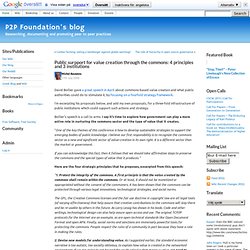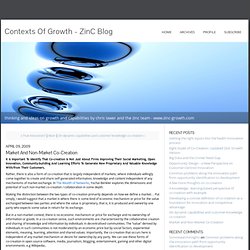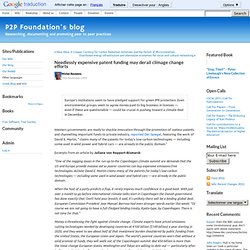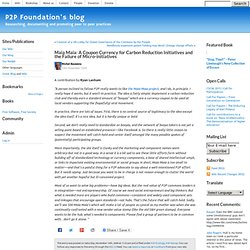

P2P & Economy. Public surpport for value cre. David Bollier gave a great speech in April about commons-based value creation and what public authorities could do to stimulate it, by focusing on a fourfold strategy framework.

I’m excerpting his proposals below, and add my own proposals, for a three-fold infrastructure of public institutions which could support such actions and strategy. Bollier’s speech is a call to arms: I say it’s time to explore how government can play a more active role in nurturing the commons sector and the type of value that it creates. “One of the key themes of this conference is how to develop sustainable strategies to support the emerging bodies of public knowledge. I believe our first responsibility is to recognize the commons sector as a new and significant sector of value-creation in its own right. It is a different sector than the market or government. Here are the four strategic principles that he proposes, excerpted from this speech: “1. 2. 3. 4. But how exactly can such policies be institutionalized? The Empty Whitecoat: Market and Non-Market Co-Creation.
Rather, there is also a form of co-creation that is largely independent of markets, where individuals willingly come together to create and share self-generated information, knowledge and content independent of any mechanisms of market exchange.

In The Wealth of Networks, Yochai Benkler explores the dimensions and potential of such non-market co-creation / collaboration in some depth. Africa: the return of the Com. Via Pambazuka news: (excerpt from original article which has references) Korir Sing’Oei: “I argue here that the choice of Ostrom for this important award is perhaps more significant for Africa’s poor than the recognition bestowed upon president Obama, our collective pride for the latter’s international respect notwithstanding.

Since the 1960s, the predominant policy prescription for ensuring the sustainable exploitation of land resources in Africa has been the individualisation of land held under custom. Needlessly expensive patent f. Europe’s institutions seem to have pledged support for green IPR protection.

Even environmental groups seem to agree money paid to big business in licenses — even if these are questionable — could be crucial in pushing toward a climate deal in December. Western governments are ready to shackle innovation through the promotion of useless patents and channelling important funds to private industry, reported Der Spiegel, featuring the work of David E.
Martin, ” claims many of the patents for today’s low-carbon technologies — including some used in wind power and hybrid cars — are already in the public domain.” Excerpts from an article by Juliane von Reppert-Bismarck: “One of the nagging issues in the run-up to the Copenhagen climate summit are demands that the US and Europe provide massive aid so poorer countries can buy expensive emissions-free technologies. When the host of a party predicts a flop, it rarely inspires much confidence in a good bash. “But what government is going to start? Maia Maia: A Coupon Currency. Maia Maia: A Coupon Currency for Carbon Reduction Initiatives and the Failure of Micro-initiatives Michel Bauwens 14th November 2009 A contribution by Ryan Lanham: “A person inclined to follow P2P really wants to like the Maia Maia project, and I do, in principle.

I really hope it works, but it won’t–in practice. In practice, there are lots of issues. Second, we don’t really need to standardize on booyas, and the network of booya takers is not yet a selling point based on established presence—like Facebook is. More importantly, the site itself is clunky and the marketing and component names seem arbitrary–but not in a good way. Most of us want to solve big problems—have big ideas. Maia Maia: An Emission Reduction Currency System. P2P & Politics. Our Panarchic Future. A theory that explains the evolution of ecosystems may apply to civilizations as well-and it says we're approaching a critical phase.

[Editor's note: The following article is adapted from The Upside of Down: Catastrophe, Creativity, and the Renewal of Civilization, by Thomas Homer-Dixon (copyright © Resource & Conflict Analysis, Inc.) and printed by permission of Island Press, Washington, D.C. (www.islandpress.org).] Buzz Holling, one of the world's great ecologists, is a kind and gracious man, with a shock of white hair and a warm smile. Born in Toronto and educated at the University of Toronto and the University of British Columbia, he worked for many years as a research scientist for the government of Canada, where he pioneered the study of budworm infestations in the great spruce forests of New Brunswick.
Since the early 1970s, Holling's research has attracted attention in disciplines ranging from anthropology to economics. Dangerous Efficiency Nested Cycles Lessons from Rome... Peer 2 Peer University / About P2PU. Mission The Peer 2 Peer University is a grassroots open education project that organizes learning outside of institutional walls and gives learners recognition for their achievements. P2PU creates a model for lifelong learning alongside traditional formal higher education. Leveraging the internet and educational materials openly available online, P2PU enables high-quality low-cost education opportunities.
P2PU - learning for everyone, by everyone about almost anything. Values The following values and principles are the foundation of P2PU: openness, community, peer learning. P2PU is open: Open sharing and collaboration enable participation, innovation, and accountability.